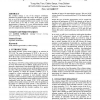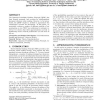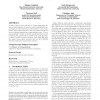1213 search results - page 44 / 243 » Approximation in quantale-enriched categories |
ATAL
2010
Springer
14 years 11 months ago
2010
Springer
Robotic swarms, like all spatial computers, are a challenging environment for the execution of distributed consensus algorithms due to their scale, diameter, and frequent failures...
GECCO
2008
Springer
14 years 11 months ago
2008
Springer
The evolution strategy is one of the strongest evolutionary algorithms for optimizing real-value vectors. In this paper, we study how to use it for the evolution of prediction wei...
SIGIR
2010
ACM
14 years 10 months ago
2010
ACM
The Quantum Probability Ranking Principle (QPRP) has been recently proposed, and accounts for interdependent document relevance when ranking. However, to be instantiated, the QPRP...
117
click to vote
FOGA
2011
14 years 1 months ago
2011
It was recently proven that sets of points maximizing the hypervolume indicator do not give a good multiplicative approximation of the Pareto front. We introduce a new “logarith...
GECCO
2006
Springer
15 years 1 months ago
2006
Springer
Evolutionary Computations in dynamic/uncertain environments have attracted much attention. Studies regarding this research subjects can be classified into four categories: Noise, ...



